The Invisible Population
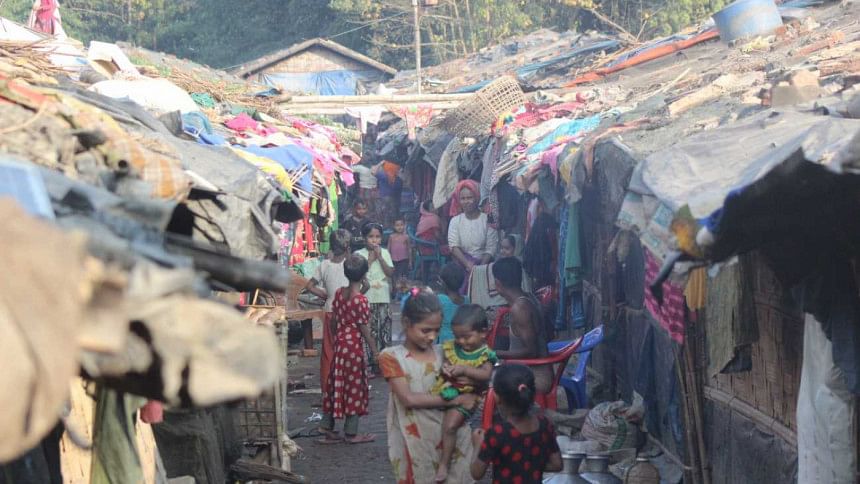
Senwara Begum sits at the door of her small hut with her nine-month-old baby at her breast. She has three other children, but there is nothing in the house to feed them. So, she has sent them to have their midday meal at their grandmother's hut in another part of the sprawling Kutupalong settlement for Rohingya refugees.
Months ago, Senwara was living in her own country, Myanmar, on her own land. She was poor, but with three to four head of livestock, and with her husband doing occasional labour work, meals were never an issue.
But on October 9 last year when armed insurgents attacked the Myanmar border posts, the military retaliated with a brutal crackdown on the Rohingya minority.
The military entered Senwara's house at 4 am one morning, looted all her belongings and livestock, and took her husband away. Finding no trace of him, Senwara left him for dead and fled with her children. She is among 73,000 new arrivals who have crossed the Naf River into Bangladesh since the operation began.
Senwara was luckier than many of her neighbours to have made it here alive, but she worries about her infant, who is unnervingly quiet these days. And prospects of achieving self-sufficiency in the camp are bleak.
The lethargy that characterises the Kutupalong makeshift camp leaves only the children untouched – they run around playing and doing chores. The women sit about with the younger children, cook what little food they have, and socialise with their neighbours. The men are either away at work in the surrounding fields and villages or hanging around the camp with nothing to do.
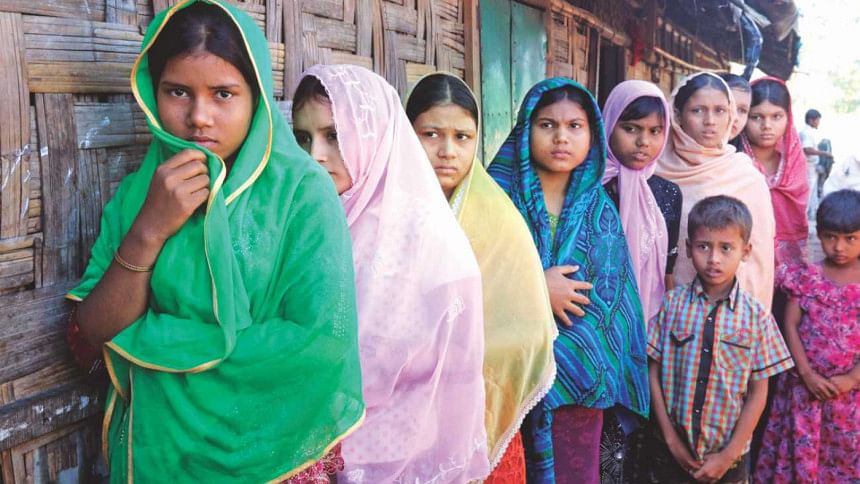
Desperate flight
The Bangladesh government has come under criticism for pushing desperate Rohingya refugees back into Myanmar. However, commanding officer of the Border Guard Bangladesh (BGB) in Teknaf, Md Abuzar Al Zahid, said his battalion was struggling to balance their duty to protect the border and the humanitarian aspect of the refugee influx.
"One woman arrived at the border heavily pregnant," Zahid said. The border guards admitted her and two companions and escorted them to the clinic run by Ithe nternational Organisation of Migration in Teknaf. In cases where victims require urgent medical attention, the BGB allows refugees to enter. Most refugees, however, enter unnoticed. Zahid emphasised, "This is a porous border … it is not possible to provide hand to hand guards along the border."
Senwara's block at the Kutupalong makeshift settlement is inhabited mostly by survivors from the village of Bura Shiddar Para in Maungdaw district of Rakhine state. They gathered around to tell us what happened during the operation.
Members of the security forces would regularly get drunk before arriving to terrorise the village, they said. They looted valuables, shot at the men fleeing, and rounded up women and girls who caught their eye.
"Women were raped in their homes and then forced to state on video that they hadn't been touched, while another soldier held a gun to their husbands' heads," said block leader Fazal. One woman in the gathering claimed that soldiers raped her sister-in-law but when she refused to lie on video, they killed her and her husband both.
We met Fazal, a young man, as we were talking to Senwara Begum. He spoke Bangla well and seemed eager to share stories about her and the other residents of his block who were mostly from the same village back in Myanmar. As block leader, he keeps tabs on all of the residents of his block but lacks the authority to intervene on their behalf with aid agencies.
Such accounts of forced disappearances, indiscriminate shooting, and sexual violence, are mirrored in testimonies gathered in a recent Office of the United Nations High Commissioner for Human Rights (OHCHR) report on the violence Rohingya have endured.
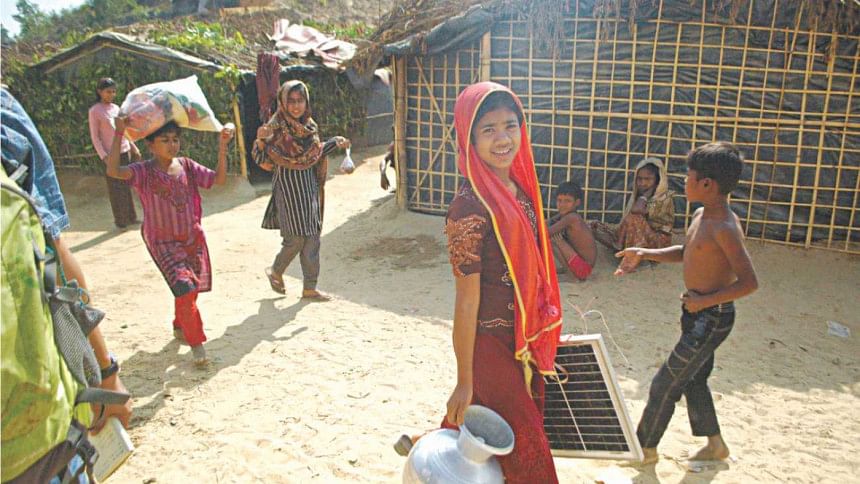
Present circumstances
Some 300,000 to 500,000 Rohingya have entered Bangladesh over the years to escape persecution in Myanmar. Only around 32,000 living in the "registered" camps at Nayapara and Kutupalong are officially recognised by the government as refugees. The unregistered majority are lacking all basic necessities.
Of the money refugees can bring with them, much is spent on paying for passage, and buying plastic sheeting and bamboo to build a hut to live in. Many get help from fellow refugees and locals for even this much.
Building an independent life here as an unregistered refugee is almost impossible, particularly for women whose husbands have been jailed or killed. These families are left with no breadwinner and many mouths to feed.
Livelihood options for camp dwellers are scant. Rohingya women depend primarily on aid, help from relatives and locals, or, as a last resort, begging.
Women and children can be seen sitting by the side of the Cox's Bazar-Teknaf highway every morning, hoping to receive handouts from locals or tourists who pass through on their way to popular holiday spots such as St. Martin's Island.
The World Food Programme (WFP) and Action Contre La Faim (ACF) are providing emergency food aid – 50 kg ration of rice every month – to new arrivals at the camps. Every two weeks WFP additionally provides supplementary food to the refugees, for young children, and pregnant and lactating women.
This is all the aid that new arrivals such as Senwara have received so far. The food is insufficient, she said. For the needs of her and her four children, and the "rent" on her small hut, she relies on her extended family. Despite the camp being on land belonging to the Forestry Department, hut owners have to pay Tk. 200 per month to an influential local. Senwara said that he is accommodating, and does not press her when she is unable to pay full rent.
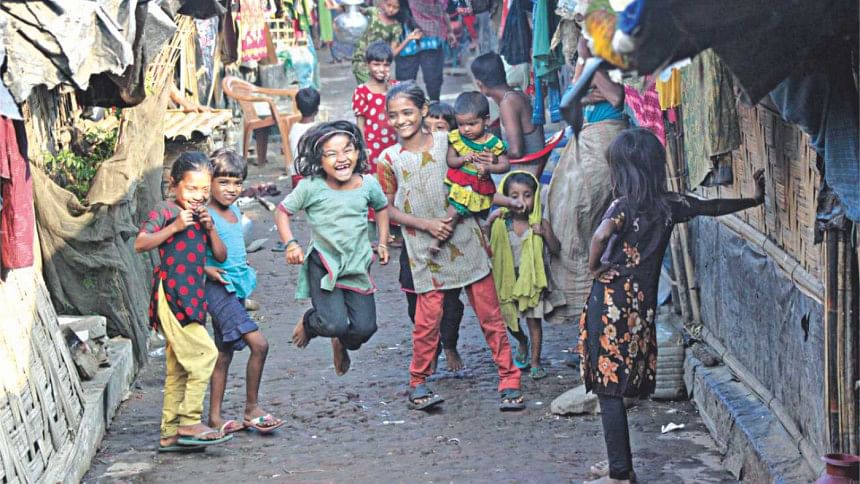
Minara Begum, who lives across from Senwara, and also has an infant at her breast, claims she does not receive aid. Her other neighbours attest to this.
"There are so many families who are not getting aid and appear to have been missed in the WFP records. There is little I can do about it because I have no card," said block leader Fazal. Leaders of older blocks at Kutupalong have a card which authorises them to intervene on behalf of camp dwellers. UN agencies and local and foreign NGOs struggle to provide humanitarian assistance to more and more refugees in the unregistered camps and settlements. About seven kilometres away, Balukhali camp only recently started receiving aid. For five months, residents have only received sporadic aid from local charities.
Dildar Begum, a widow from Kurkhali in Maungdaw, lives in a hut in Balukhali camp having arrived in Bangladesh in the beginning of February. She has five children to feed. Her two sons, eight and ten years of age, are off to hopefully collect some lakri, or firewood, to sell. Her eldest daughter, Setara Begum, also chips in by collecting dry twigs for cooking fuel.
Dildar is prone to episodes of schizophrenia. Soon after arriving in Bangladesh, she left her children behind in someone's house and wandered off. Luckily, her sisters found her and built her a hut in Balukhali. They say she has been like this since childhood. They keep a protective watch on her family, but can hardly provide for her. One of them is a widow and the other's husband cuts and sells firewood. A full day's bundle sells for Tk. 150 or less.
Dildar's family gets by with help organised within the camp by the block's Imam. Her neighbours, who are themselves often left wanting for the lack of a square meal, pitch in for this family.
The International Organisation for Migration (IOM), by government mandate, coordinates humanitarian services provided at the unregistered camps. At Leda, it runs a 10-bed clinic where mostly women and children are seen to queue up every day. Médecins Sans Frontières (MSF) operates a clinic in Kutupalong, but new refugees say they find the treatment ineffective.
They prefer local, semi-trained village doctors who charge Tk. 300-500 per visit, and prescribe a lot of medication to cure symptoms quickly.
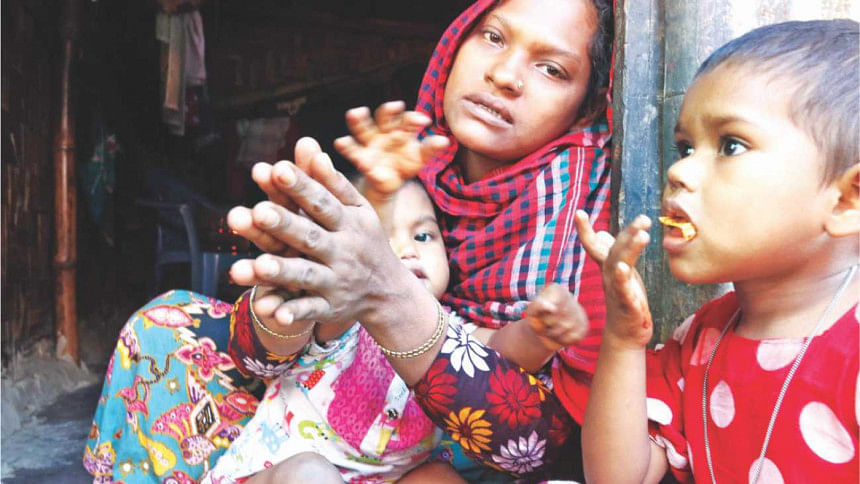
Minimal access to education
Rohingyas who fled to Bangladesh earlier have been able to scratch out a living and get their children schooling in the makeshift settlements. Others have eventually left the camps and managed to integrate into host communities in other parts of the region and the country. This however has been an upward struggle over the years.
Mohammed Kaiser, taller than most others his age, is luckier than his friends. His parents have more resources and willpower than most. After completing his studies at the madrasa in the camp, his mother was determined that he would continue his education at the local school. But the difficulty in procuring papers and the associated transport and meal costs, which could be as much as Tk. 50-60 daily, proved too much for the family to bear.
Ismat Ara, Kaiser's mother, then decided to hire a private tutor at the camp. "I really want him to receive a good education but we don't have papers to get him admitted to school. Even if I have to go through hardship, I will get him educated. "Like many other young boys in Bangladesh, Kaiser enjoys playing football and supports the Brazil team, and wants to grow up to be a doctor or an engineer.
A joint IOM-UNICEF endeavour to provide non-formal education to children at the makeshift settlements in Leda and Kutupalong is scheduled to begin later this year. The IOM office in Dhaka, when contacted, said that the demand is much greater but there is insufficient space within the camps for further learning centres.
Meanwhile, many children have no access to comprehensive education. Some madrasas teach mathematics, English and Bangla, but many only teach religious material. Hafiz Shafiq, a teacher in Balukhali, said that his madrasa only teaches the Arabic script. His own son has no opportunity to learn Bangla or English.
Though Rohingya refugees may over time build a life here in Bangladesh, their inability to return to Myanmar due to the continued oppression there and their undocumented status in Bangladesh leaves them as insecure as ever. A 2015 plan to relocate Rohingya refugees to a remote island, Thengar Char, in the south of Bangladesh has recently been revived. Are they only to be uprooted again?
With additional reporting by Naushad Ali Husein





Comments